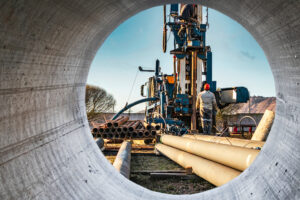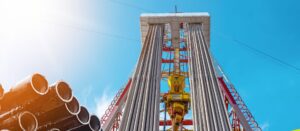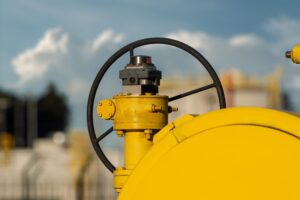Offshore drilling is a double-edged sword.
Extracted crude oil and natural gasses help turn the gears of society, from powering the most common forms of transportation to making sure lights at home can be turned. They even serve as raw materials for products people consume regularly.
On the other hand, many people ask if offshore drilling is safe for people, marine life, and nature. The simple answer is that oil and gas operations are always risky to some degree, but the industry as a whole is working harder than ever to mitigate those risks.
New products, like pipe protection products made by MSI, are being used to eliminate many of the most common risks that plagued the industry in past decades. Here’s a quick look at how offshore drilling works and the benefits and the consequences of it.
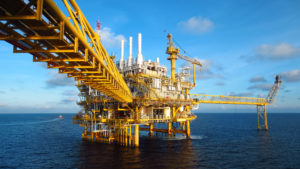
Offshore Drilling Explained
Offshore drilling is the extraction of crude oil from reserves beneath the oceans instead of wells on the mainland. Crude oil is produced from the Earth through onshore and offshore drilling, but off-shore drilling is playing a bigger role in the industry as onshore options become harder to find. By 2025, around 28% of oil will be produced offshore, while 72% will still be produced onshore.
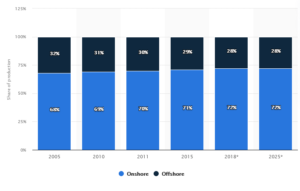
Offshore drilling is a complex process that requires special equipment. This is where floating oil rigs come into play. They are specifically designed to float about undersea oil reserves and extract the oil safely from miles below the surface of the ocean.
Once crude oil is produced, a network of pipes or ships is used to transport oil to land. The quality of the engineering on these projects is very important since the pipes cannot leak at all. Highly accurate manufacturing, as well as construction teams that use pipe protection and fitting tools, create water-tight pipes that can transport crude oil for miles
Why is Offshore Drilling Increasing?
The popularity of offshore drilling went up to meet the increasing demand from society for oil and other petroleum products. As the need for petroleum products increases around the world, countries are looking for new sources of oil to become self-sufficient.
Doing so means more control over the price of petroleum products that each country needs to keep up with global advancement. In many cases, the excess oil can be sold for profit to support countries in other ways.
Offshore oil drilling is becoming more popular since many of the onshore options are already found or depleted. The industry must continue to expand its oil fields in order to keep up with rising demand and depleting resources. In many cases, offshore drilling is easier than the remaining onshore options, which can be remote or in places that countries cannot enter.
To put this increase in oil consumption into perspective, global crude oil production hit an all-time high at 95 million barrels per day in 2019. Demand swung from 91 million barrels a day in 2020 to around 96.5 million a day in 2021. It is clear that the demand for oil products is driving development around the world. Fortunately, the industry is able to keep up with the demand.
6 Economic and Environmental Benefits of Offshore Drilling
Whether the efforts to meet the demand for crude oil involve drilling off the coast of a specific country, overseas drilling, or mobile offshore drilling, no one can deny the benefits it brings, including the following:
1. Creates Jobs and Gives the Economy a Boost
Besides the United States, countries such as Russia, Saudi Arabia, and China have achieved economic stability due to recovering crude oil and natural gas. With domestic production, gas and energy prices go down, which dictates how well an economy will perform.
One of the clear benefits of offshore drilling is it creates desirable jobs. According to the Bureau of Ocean Energy Management, during the 2020 fiscal year, the offshore oil and gas industry supported 176,000 jobs in the United States, translating to $11.9 billion in labor income, $20.6 billion worth of contribution to GDP, and $38.1 billion in output.
The entire area proximal to the offshore drilling rigs benefits from spendable money in the local market. As a result, small businesses grow and the area transforms into an attractive place to stay. Consequently, real estate values go up. With drilling jobs spreading effects across the country, nearly every aspect of the economy gets the help it needs.
2. Increases Oil Production
According to the International Energy Outlook report of the US Energy Information Administration, the global supply of crude oil biofuels and other hydrocarbons will be sufficient to meet liquid fuel demands through 2050.
The demand for crude oil has been upward through the years. To make a clear comparison, in 2010, the daily oil demand was only pegged at 86.4 million barrels a day. The United States became the top crude oil producer since 2018. Oil comes from 32 US states, and in 2021, about 29% of crude oil came from wells located offshore. The rest of the 71% came from mostly five states, with Texas being the largest producer.
Increased oil production allows countries to focus on their own energy needs. A good volume of oil supply is also traded, giving countries bargaining power on the global stage.
3. Helps Developing Countries
As oil drilling and exploration technologies advance, developing countries with untapped oil resources will be able to make the most of the economic potential of these reserves and be less reliant on oil imports. It not only helps them become self-sufficient but also allows these countries to become truly developed.
4. Paves the Way for New Habitats
Many are afraid of the risk of oil spills that can potentially be a disaster for the environment, marine life, and nearby communities. However, oil rigs can actually help create unique habitats for different creatures, such as birds, fish, and other water creatures.
Oil rigs can become the foundation for new coral reefs. An excellent example of this is how retired oil rigs off the coast of California are seen as potential artificial reefs to create new habitats. While oil rigs are not specifically designed for this, they can be a valuable contribution to helping species survive climate change.
5. Reduces Tax Liabilities and Supports Investment Accounts
With the money funneled from the operation of offshore oil rigs, government royalties can be used to ease down the tax liabilities of locals or even bigger population groups.
Likewise, oil is also a great way for people to invest in commodities. While not exempt from volatility, geopolitics, and other factors, investing in oil can help diversify portfolios and gain positive returns.
6. Pushes the Limits of Technology and Exploration
Even though we are able to drill the ocean floor for oil, relatively little is known about deep ocean environments. Before oil wells are dug, extensive surveying and exploration of the area need to be finished first. That means every time a new offshore oil rig is set up, companies get to explore the area and learn more about the ocean.
More than that, deep sea drilling is pushing companies to develop new technologies that make it easier to reach lower depths and explore. For example, oil rigs can be taller than skyscrapers. This requires special construction and maintenance systems to keep everything working smoothly. Oil and gas companies are working hard to develop new vehicles, drones, and other technologies that can explore as deep as oil rigs can reach, which will open up a new wave of exploration and discovery in the Earth’s oceans.
Offshore Drilling Consequences
Opposing the economic and environmental benefits, offshore drilling also comes with potentially dangerous consequences, such as oil spills and drilling accidents. Undeniably, oil spills and other accidents on offshore oil rigs directly impact the environment and pose risks to marine life and nature.
Since 1969, there have been thousands of oil spills each year. But according to NOAA’s Office of Response and Restoration, these are small ones that spill less than a barrel of oil.
Unfortunately, there have been 44 bigger ones, with each incident spilling over 10,000 barrels in US waters. Some causes of disasters in drilling rigs include collisions, structural failures, inadequate safety procedures, rogue waves, and blowouts.
This is why the oil industry is heavily regulated, meaning guidelines are in place to ensure exploration, production, transportation, and other activities in the sector are safe for humans and the environment. For example, in the United States, there are state and federal laws and rules governing onshore and offshore oil drilling.
How Pipe Protection Help Prevent Oil Spills
In nearly all cases where there is a major oil spill, the source pipeline– the pipe that carry oil from the source to the rig, ship, or refinery– is damaged. In some cases, this can happen during an accident. In other cases, it can be caused by using pipe that is damaged before being installed.
The oil and gas industry uses pipe that is machined with a high level of accuracy. Threading, in particular, is susceptible to damage when moving or installing pipe. To prevent this, companies like MSI developed a wide array of pipe protection products.
For example, our thread and bevel-end protection devices can be installed onto the ends of pipes to provide needed protection from pipe end damage that can lead to costly downtime during pipe installations offshore along with future potential environmental issues.
There are many ways that pipe protection systems can reduce the risk of an oil spill. MSI is committed to improving the safety of the oil and gas industry.
Contact us today to learn more about our range of Oil Country Tubular Goods (OCTG), line pipe, and drill pipe applications.

